Gender-based harassment and violence: Prevention requires coordinated initiatives

Shirin Akhter MP, Vice Chairman, BILS & Member, Parliamentary Standing Committee on the Ministry of Primary and Mass Education
Today, we will discuss the status and prospect of the prevention of sexual harassment at the workplace. This is a timely initiative. We have invited different stakeholders who have been working on this issue for a long time. I believe today's discussion will generate important recommendations that will help us tackle gender-based harassment and violence in the world of work.
We already have many laws regarding the prevention of violence against women. What we need is the proper implementation of these laws. We have to change the mindset of the people responsible for implementing these laws on the ground.
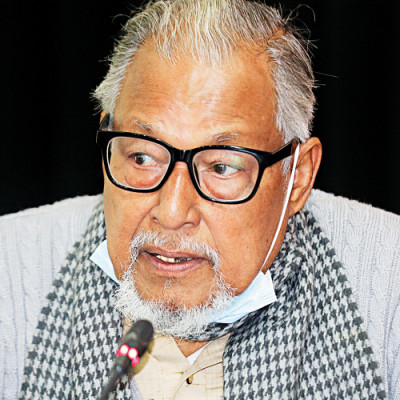
Nazrul Islam Khan, Secretary General & Executive Director, BILS
The Parliamentary Standing Committee on Ministry of Law, Justice and Parliamentary Affairs has already recommended the Law Ministry to assess the necessity of a new law for preventing sexual harassment. On December 21, 2021, National Human Rights Commission handed over the draft 'Sexual Harassment Prevention and Protection Law 2021' to the law minister. We hope that this draft will be placed at the Parliament, and we will get an effective law soon. In some cases, laws fail to deter the perpetrators due to some inherent weakness of the law. We should be careful about such loopholes while formulating this law.
In today's roundtable, we will discuss if there are any shortcomings of the draft and how these can be addressed. Another important discussion topic is the ratification of the ILO Convention 190. The tripartite stakeholders of the labour sector are already working on this issue, and we can make recommendations on how to coordinate our initiatives among ourselves.

Nazma Yesmin, Director, BILS
Bangladesh has been ranked as the top country among its South Asian neighbours for its performance in bringing down the gender gap. According to the Global Gender Gap Report 2020, Bangladesh closed 72.6 percent of its overall gender gap and obtained 50th position out of 153 countries globally. Again, according to World Bank, between 2010 and 2020, women's labour force participation increased from 29.9 percent to 36.4 percent. However, women's participation rate is still significantly lower than that of men (81.3 percent).
There are four types of gender-based violence: physical violence, sexual violence, emotional and psychological violence, and socioeconomic violence. A major consequence of gender-based violence is child marriage which seriously affects every aspect of a woman's life as well as the society. According to WHO, one in every three women has experienced physical and sexual violence in their lifetime. Women face violence in both the domestic and public spheres. A survey conducted by Manusher Jonno Foundation between April 2020 and September 2021 shows that 48,233 women and children faced domestic and other forms of violence during the COVID-19 pandemic.
BILS's survey of 11 national newspapers shows that between January and December 25 of last year, 139 female workers faced gender-based harassment and violence. Of these women, 54 faced violence at the workplace, and 85 outside the workplace. A TIB study reveals that 5.6 percent of women UNOs have been sexually harassed while performing their duties.
The Bangladesh government has ratified several international instruments regarding the prevention of violence against women: Charter of Human Rights, CEDAW, Convention on the Rights of the Child, International Conference on Population and Development Programme of Action and the Beijing Declaration and Platform for Action. The government is also working towards achieving the SDGs of which Goals 3, 5 and 16 are directly linked to the prevention of gender-based harassment and violence. However, the government is yet to ratify the ILO Convention 190 which stipulates the elimination of violence and harassment in the world of work.
There are also several national laws and policies for the protection of women and children: Nari o Shishu Nirjaton Daman Ain 2000, National Children Policy 2011, National Women Development Policy 2011, Domestic Violence (Prevention and Protection) Act 2010 and Domestic Violence (Prevention and Protection) Rules 2013, Bangladesh Labour Act 2006, Domestic Workers Protection & Welfare Policy 2015 and Pornography Prohibition Act 2012. But most importantly, the High Court Verdict (2009) is directly related to the protection of women against sexual harassment.
Now, I want to highlight the activities of the Gender Platform which was established in 2017 with the vision of ensuring an equality-based work environment. The mission of this platform is to work together with like-minded human rights and labour rights organisations to create a work environment that is free of violence and sexual harassment and is dignified for all. Six national organizations are members of this platform, namely Awaj Foundation, Bangladesh Institute of Labour Studies (BILS), Bangladesh Labour Federation (BLF), Bangladesh National Women Lawyers' Association-BNWLA, IndustriALL Bangladesh Council and Karmojibi Nari.
The platform has prepared a draft law on the prevention of sexual violence at the workplace. It has carried out massive awareness campaigns on various aspects of this draft law. The draft was handed over to the Law Minister and the State Minister for Labour and Employment on September 12, 2018. The platform has also shared the draft with the Attorney General and representatives of BGMEA. It has provided detailed comments on the draft prepared by the National Human Rights Commission.
The ministry of women and children affairs, in its national workplan for preventing violence against women and children for the duration 2013-2025, has expressed its commitment to take initiative for enacting new laws in accordance to the High Court Verdict (2009) for preventing sexual harassment. On December 5, 2021, the Parliamentary Standing Committee recommended the Ministry of Law to assess the necessity of a new law for the prevention of sexual harassment. The National Human Rights Commission handed over the draft 'Sexual Harassment Prevention and Protection Law-2021' to the law minister on December 21, 2021.
In today's roundtable, we want to reiterate the demands of the Gender Platform Bangladesh: ensure implementation of the High Court Verdict 2009; enact the law for prevention of sexual harassment at workplaces; and ratify ILO Convention 190.

Abul Hossain, Coordinator (Acting), Domestic Workers Rights Network (DWRN)
Most of the domestic workers are women. They are the furthest left behind in society. Unfortunately, they are not even recognised as workers. The government approved the Domestic Workers' Protection and Welfare Policy in 2015 but it is not being executed on the ground. The government didn't ratify the Domestic Workers' Convention 2011. I believe, an effective law on the prevention of gender-based violence at the workplace would go a long way in ameliorating the miserable condition of domestic workers. We must work together as a pressure group so that our demands are taken seriously by the government.
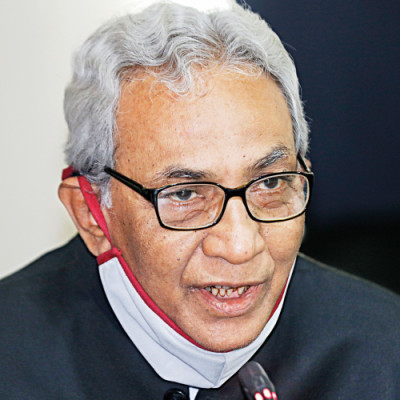
Noor Kutub Alam Mannan, Acting President, Jatio Sramik League
We should focus on creating social awareness about sexual harassment and gender-based violence. Once a comprehensive law on sexual harassment is passed, we should conduct orientation sessions at workplaces and educational institutions so that everyone is aware about the law and the consequences of its violation.
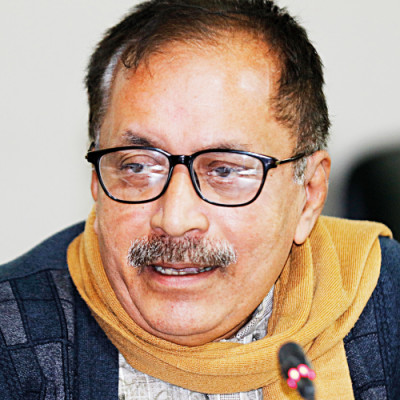
Quamrul Ahsan, Joint Coordinator, Sramik Karmochari Oyikko Parishad-SKOP
The society has an important role to curb gender-based violence. Therefore, we should focus on creating mass awareness regarding the ill consequences of violence against women.
Religious Fundamentalist groups often get in the way of women's empowerment. The government should not let these forces prevent gender equality in all spheres of life.

Abdullah Hil Rakib, Director, BGMEA
Workers are the economic freedom fighters of the country. BGMEA believes that a productive and friendly workplace makes an enterprise sustainable and profitable which also contributes to the society and the nation. We also believe that the more women are given leadership roles, the more the company enjoys sustainable growth.
BGMEA is emphasising the achievement of all the 17 SDGs in its work plans. Women's empowerment is key to achieving SDGs and it is vital for our growth. If we want to realise this goal, we must ensure their safety at workplaces. This would require us to change the mentality of the employers. We can do this by raising awareness about women's rights and their contributions to the overall development of the country.
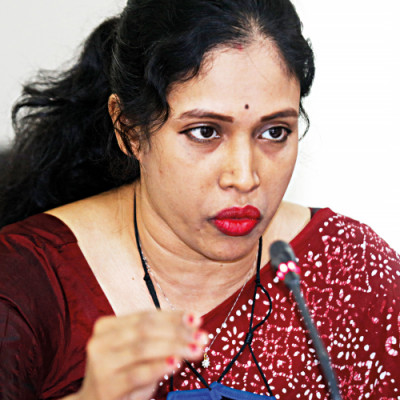
Susmita Paik, Deputy Director, National Human Rights Commission
The Gender Platform has played a key role in preparing the draft of the law on prevention of sexual harassment at the workplace. We have handed over the draft with our inputs to the honourable law minister. Now, we have to push on with our advocacy campaigns for the enactment of the law.
We should also not forget our third-gender population, as ensuring their rights is equally important for achieving equality for all in the society. The National Human Rights Commission is currently conducting a study to find out the real causes of gender-based violence in Bangladesh.

Naimul Ahsan Jewel, General Secretary, Jatiya Sramik Jote Bangladesh
I think there should be a hotline or emergency response point which women can reach out to if they face sexual harassment at their workplace. BBS should conduct a survey to find out the exact number of domestic workers in Bangladesh. They can include a separate section on this sector in their ongoing survey. We should also seriously consider the challenges faced by women with disabilities at their workplace.

Md. Feroj Hossain, Trade Union Coordination affairs Secretary, Jatiya Sramik League
A woman with a job is also responsible for taking care of the household. Whenever someone at home falls sick, women are the ones responsible for taking care of them. But who takes care of these women when they fall sick? We need to change this mentality. The household responsibilities should be equally distributed among all the members of the family.
At the beginning of every programme, we should take an oath that we will work for prevention of gender-based violence in all spheres of life.
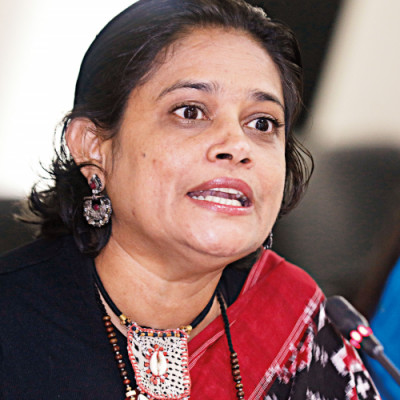
Nazma Akhter, Founder and Executive Director, Awaj Foundation
Women contribute more to economy in Bangladesh than their male counterparts. To give women the respect and rights they deserve, we need to formally recognise their contributions.
This law is not for women alone. It calls for protection of every human being irrespective of their gender identity.
We need to make people aware of what constitutes sexual harassment because many times they may not realise that they are sexually harassing a person.
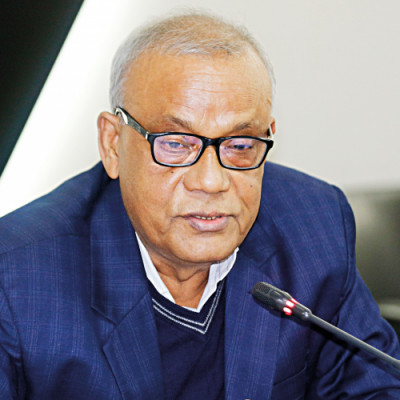
Abul Kalam Azad, Joint General Secretary, Bangladesh Trade Union Centre
Today, we are talking about passing laws and ratifying the ILO convention to combat sexual harassment. But we must remember that plenty of laws exist in the country that are not implemented properly. Laws that are meant to protect the vulnerable are instead used by the rich and the powerful for their own benefit. That is why we should simultaneously focus on the successful implementation of the law. The law should contain provisions for its effective implementation as well as for creating a powerful deterrence effect. Finally, to successfully pass this law and ensure its proper implementation, we need the commitment of our political leaders.
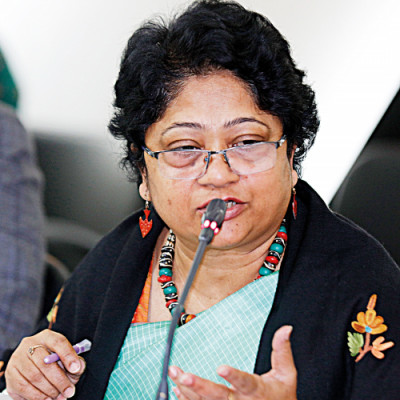
Sunzida Sultana, Executive Director (in-charge), Karmojibi Nari
There should be strong political commitment regarding prevention of sexual harassment at workplaces. Along with that, we need a social and cultural movement to bring changes to the existing patriarchal norms in Bangladesh.
As long as the law for prevention of sexual harassment at workplaces and educational institutions is not passed, the High Court Verdict (2009) should work as a legal instrument. Still, many organisations ignore this verdict. Monitoring committees should be formed to make sure that all the organisations in Bangladesh form harassment complaint committees following the High Court directives.
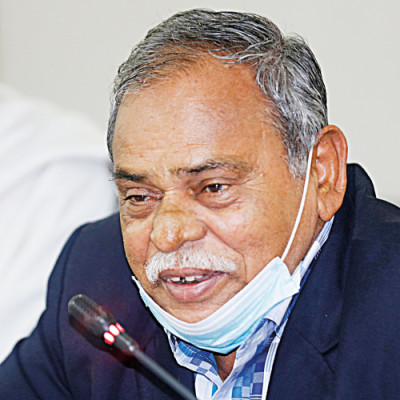
Anwar Hossain, President, Bangladesh Jatyatabadi Sramik Dal
One of the first steps we need to take is to change the mentality of society. In our country, fundamentalist groups often justify sexual harassment. We need to change this mentality starting from family to national level. Otherwise, they will be a hindrance to the achievement of women's empowerment in Bangladesh.

Razekuzzaman Ratan, President, Samajtrantik Sramik Front
While we need strict punishment for anyone who commits sexual harassment or gender-based violence, this alone will not change the culture. We must provide counselling to offenders and make them understand why what they did was wrong.
All workplaces and educational institutions should prominently exhibit what constitutes sexual harassment and what one should do in case she or he faces such an incident.
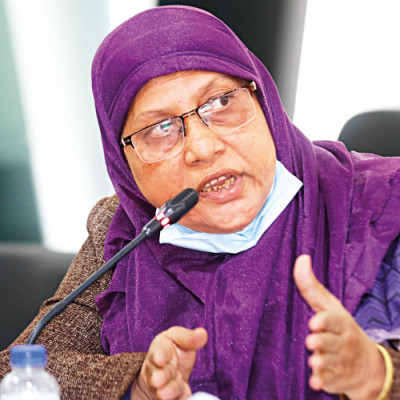
Sayeda Azizun Nahar, Senior Vice President, Bangladesh Labour Federation
While we are talking about sexual harassment at workplaces, we should keep in mind the sufferings of domestic workers. We already have several legal instruments for the protection of women. We should simultaneously work together towards the implementation of the existing laws.
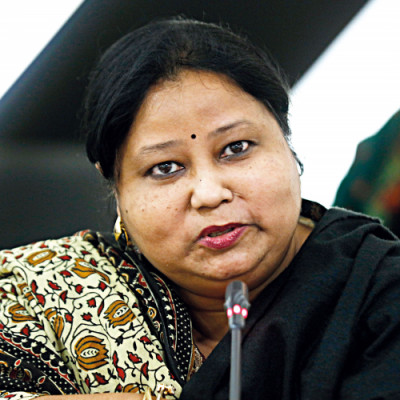
Advocate Sara Tanjina Eva, Legal Coordinator, Fair Wear Foundation
Even though the law is yet to be passed, it is still mandatory for workplaces and schools to have complaint committees for sexual harassment. However, we often see resistance against the formation of such committees. Therefore, we need to raise our voice and make sure that all managers and supervisors understand their responsibility to provide a harassment-free work environment.

Shamsun Nahar Bhuiyan MP, Member, Parliamentary Standing Committee on the Ministry of Labour and Employment
Women have been playing a significant role in the country's development since our independence, both in the public and the private sector. Yet, they are often harassed and mistreated at their workplaces.
Our aim is to become a developed country by 2041, but is that possible without ensuring equal rights for women? Nearly half of our population are women, and if we cannot ensure their safety and grant them their rights, then we will not be successful in achieving our vision.
This is why it is essential that we start from the school level. If we can teach our children to respect women, then we can reduce gender-based violence and ensure equal rights for women in the long run.
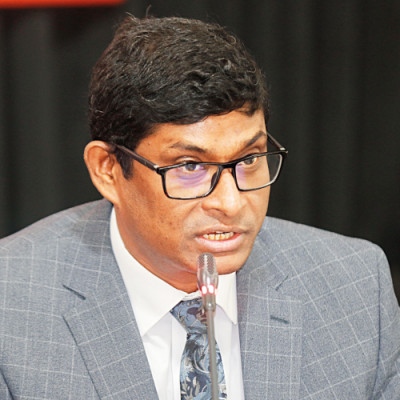
Barrister Shameem Haider Patwary MP, Member, Parliamentary Standing Committee on the Ministry of Law, Justice and Parliamentary Affairs
In the last 50 years, we focused only on affluence, GDP, and so-called growth. But we could not sufficiently concentrate on achieving holistic development, humanity, and equal rights for all. The government is prioritizing infrastructural development rather than societal development, but the latter is equally important. This is an area where NGOs and CSOs can play an important role. They should provide training and create awareness on key social development issues such as gender-based violence and gender equality.
The law on its own cannot always solve the problem. For example, since the law on domestic violence was passed in 2012, only 50 cases have been filed. But the number of domestic violence incidents is presumably higher in the country. Even the lawyers are not aware of this law.
To ensure proper implementation of any law there must be adequate funds and human resources on the ground. The bureaucracy plays a key role in the process. Therefore, we should take them on board while implementing any law.
Discrimination is a big barrier to the formulation of pro-poor laws in Bangladesh. Due to the excessive influence of neo-patrimonialism, formulation of laws for the protection of poor people falls at the bottom of the government's priority.
However, I hope that the law for prevention of sexual harassment at workplaces will be passed soon. Simultaneously, ILO conventions 189 and 190 should be ratified by the government as this would benefit the entire nation.
Shirin Akhter MP
We need to follow up on the status of the draft law regularly so that all our inputs into the draft reach the cabinet. I would like to request the Gender Platform to take up this responsibility.
A lot of institutions have no idea how to form a complaint committee to address sexual harassment and gender-based violence. We need to equip such institutions with the necessary knowledge and skills to effectively run these committees.
Recommendations
- Ensure proper implementation of the 2009 High Court Verdict.
- Enact law for prevention of sexual harassment at the workplace. The law should contain provisions for its effective implementation as well as for creating a powerful deterrence effect.
- Ratify ILO Convention 190.
- Create social awareness about the ill consequences of sexual harassment and gender-based violence.
- Highlight women's contributions to the overall development of the country so that their efforts are formally recognised and, thus, their social status improves.
- All organisations and educational institutions should be provided with the proper knowledge and skills to run the functions of complaint committees properly.


 For all latest news, follow The Daily Star's Google News channel.
For all latest news, follow The Daily Star's Google News channel. 



Comments